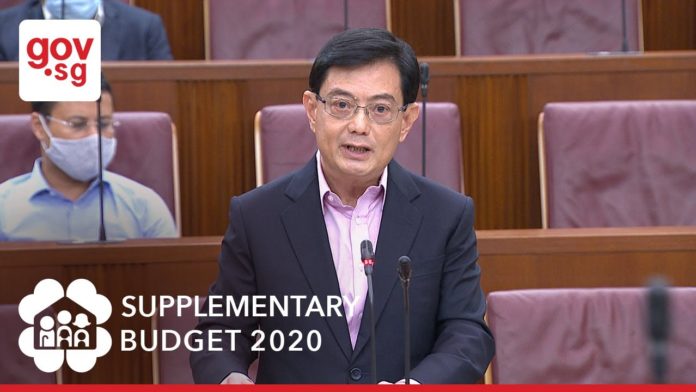In response to the sharply deteriorating global COVID-19 situation, the Fortitude Budget, the fourth for 2020, was delivered in a ministerial statement on 26 May 2020. This builds on the previous Unity, Resilience and Solidarity Budgets to help businesses and individuals adapt and build resilience, amid the COVID-19 pandemic.
In his introduction, Deputy Prime Minister and Finance Minister Heng Swee Keat noted that globally, five million people have been infected, and over 340,000 lives lost. In terms of the global economy, lockdowns and movement restrictions have exerted a huge cost, with major job losses in many economies.
This has deeply impacted Singapore, as a small an open economy whose economic outlook depends critically on the state of the global economy. At the same time, the circuit breaker, which was put in place to bring down community transmission decisively, also affected many businesses that could not operate offsite.
While there are plans to open up carefully, Mr Heng warned that many businesses will continue to be affected, while some may not return to normal. As such, the $33 billion Supplementary Budget was introduced for the next phase of our fight against COVID-19. Together with the Unity, Resilience and Solidarity Budgets, the government has dedicated close to $100 billion ($92.9 billion) – to support Singaporeans, almost 20% (19.2%) of Singapore’s GDP.
Support for businesses on the 3Cs
As businesses try hard to get back on their feet and re-open safely as they emerge from the circuit breaker, support has been strengthened on the 3Cs – cash flow, costs, and credit.
Cash Flow
The Jobs Support Scheme (JSS), which supports firms in retaining and paying their workers will be extended, increasing the duration of JSS payouts by one month for all firms.
Thus, while the JSS originally covered nine months, an additional month will be computed, at the same levels as those provided during the non-circuit breaker months. Firms will receive this additional month of payout in the October 2020 JSS payout.
For firms that cannot resume operations immediately after the circuit breaker, wage support will be continued at 75% until August 2020 or when they are allowed to re-open, whichever is earlier. This includes retail outlets, gym and fitness studios, and cinemas.
There were also refinements made in the classification of firms in the different JSS tiers, based on feedback from industry associations and businesses. In total, these three enhancements to the JSS will cost $2.9 billion. Through the JSS, the government has released a total of $23.5 billion to firms to support wage costs for 10 months.
Costs
Labour Costs
Aside from the JSS, other measures help assuage labour costs. The Foreign Worker Levy waiver and rebate will be extended for up to two months for businesses that employ migrant workers which cannot immediately resume operations after the circuit breaker period. The planned increase in CPF contribution rates for senior workers will also be deferred for a year.
Rental Costs
Assistance is also given to supporting rental costs, which are especially tough on SMEs.
First, a cash grant to offset the rental costs of SME tenants will be provided, to be disbursed through property owners. Taken together with the Property Tax Rebate, the Government will, in effect, offset about two months of rental for qualifying SME tenants of commercial properties, and about one month for qualifying SME tenants of industrial and office properties. This will be disbursed automatically to property owners from end-July.
Second, the Minister for Law will soon introduce a new Bill, mandating that landlords contribute by granting a rental waiver to their SME tenants who have suffered a significant revenue drop in the past few months.
The new Bill will also cover provisions on temporary relief from onerous contractual terms such as excessive late payment interest or charges. It will also allow tenants to repay their arrears through instalments.
If the Bill is passed by Parliament, SME tenants in commercial properties who have suffered a significant revenue drop will benefit from a total of four months of rental relief – shared equally between the Government and landlords. Other SME tenants in industrial and office properties will also be given some relief.
SMEs already benefit from temporary relief from rental payment obligations till October. Together, these promise substantial support on rental costs.
The Government also continued to set an example in supporting its tenants, providing two more months of rental waivers for commercial tenants and hawkers (for a total of five months), and one more moth of rental waiver for industrial, office, and agricultural tenants of government agencies (for a total of two months)
Credit
In addition to the various financing schemes such as the Temporary Bridging Loan Programme and the Enterprise Financing Scheme, the government adds financing support for promising startups to help them sustain their innovation and entrepreneurship journey.
$285 million has been set aside, to catalyse and crowd in at least another $285 million in matching private investments. This is in addition to the $300 million set aside under the Unity Budget for deep-tech startups to gain better access to capital, expertise, and industry networks under Startup SG Equity.
Startups can also make full use of the SGUnited Traineeship scheme, to bring in graduating students with deep interests in the fields they are exploring, and build up our talent base.
Transforming to Seize New Opportunities
Apart from the support provided to businesses in the near term, the budget also announced measures to build strong and viable businesses for the future. Two key shifts identified are the rise of digital transformation, and the decline in support for globalisation, and shifts in global supply chains.
These shifts were already taking place, but COVID-19 has accelerated them.
Building on the momentum of digital transformation
Recognising the shift in digital transformation, the budget allocates more than $500 million to support businesses in their digital transformation.
Adoption of e-payments
First, for those who have not begun using digital tools, the government will help them to get on board with digital transformation, building on current momentum. In the area of e-payments, this is mainly directed towards stallholders in hawker centres, wet markets, coffee shops, and industrial canteens.
Digital resilience bonus
The government will enhance our support for businesses which are ready to take their basic payment and invoicing functions digital. This will be coupled with support to keep their businesses running and even acquire new revenue lines. The government will help businesses to implement safe management measures and business continuity strategies to adapt to new post-COVID norms, an area that the Singapore Business Federation suggested supporting.
To give a further boost to SMEs Go Digital, which was earlier introduced to help businesses adopt digital solutions to cope with circuit breaker measures, a Digital Resilience Bonus will be introduced to help businesses take their next step to digitalise.
Starting with the F&B and retail sectors, which are most affected by the safe distancing requirements as the the economy re-opens, eligible businesses can receive a payout of up to $5,000 if they adopt PayNow Corporate and e-invoicing, as well as business process or e-commerce solutions.
Third, businesses which already have basic digital capabilities, should deepen their digital transformation. The government has announced that it will help them make use of advanced digital tools in ‘an integrated way’.
The Digital Resilience Bonus will have an additional tier of $5,000 for F&B and retail businesses which also incorporate advanced solutions, with another$250 million set aside to help businesses digitalise in partnership with digital platform solution providers and industry champions. For example, developing Offline-to-Online business models to access new domestic revenue streams and international demand. This will mitigate the impact of COVID-19 on revenue.
Supporting employment
A key focus of the budget was on jobs. For workers, various measures were introduced to support training and reskilling.
For businesses, a hiring incentive was allocated in the Unity Budget to employers to hire local workers who have gone through eligible traineeship and training schemes. In the Fortitude Budget, this has been increased.
For eligible workers aged 40 and above, the government will double the incentive to cover 40% of their salary over six months, capped at $12,000 in total.
Together with other support measures, such as the special SkillsFuture Credit top-up of $500 to every Singaporean aged 40 to 60 in 2020, the government is providing specially enhanced support for jobs and training for this group.
Further, the hiring incentive has also been expanded to cover workers of all ages. For eligible workers under 40, this incentive will cover 20% of their monthly salary over six months, capped at $6,000 in total.
In total, to deal with the impact of COVID-19 on jobs, the government has set aside about $2 billion for the SGUnited Jobs and Skills Package this year to strengthen employment and training support for our workers. The budget draws on the country’s reserves, reflecting the exceptional circumstances and the long battle against COVID-19.
















